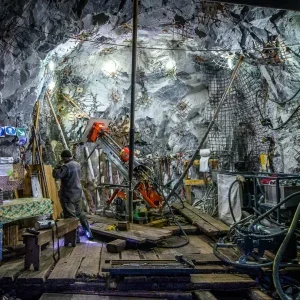
The high costs of training are blocking UK oil workers from shifting to renewables, a survey has shown.
The poll by environmental campaigners Friends of the Earth Scotland, Platform and Greenpeace, supported by RMT and Unite Scotland, was completed by more than 600 offshore workers across the oil, gas, wind and decommissioning industries.
The participants strongly supported the idea of an “offshore passport” that would allow them to easily transfer their skills and experience between sectors.
Respondents also reported they are currently forced to pay out thousands of pounds of their own money for training courses before being hired, with no guarantee of work, and are routinely having to repeat training they have already completed.
These barriers require workers to fork out for training to move to jobs in wind, despite already holding relevant qualifications. The campaign groups have warned that the government must act to remove these hurdles to ensure the UK delivers on its targets to introduce 40 gigawatts (GW) of offshore wind by 2030.
“The skills and experience of offshore workers are vital to enable a rapid shift to renewable energy, but workers cannot be expected to fork out thousands from their own pocket to duplicate qualifications they already have,” said Ryan Morrison, just transition campaigner at Friends of the Earth Scotland.
“Promises of green jobs mean little when this unregulated training regime holds back the opportunity to move between sectors. It is time for politicians to listen to these workers by creating a regulated offshore training passport to ensure a just transition for offshore workers.”
Almost two-thirds of UK oil workers said employers had paid none of their training costs in the past two years
The survey found that 94% of workers were in favour of introducing standardised training for working offshore.
On average, it showed that workers surveyed had spent £1,824 ($2,547) per year on training. They are often required to repeat existing training when starting a contract with a new employer, starting a new contract with the same employer, and when moving to jobs in other offshore sectors.
Almost two-thirds of the participants (62%) said that when taking a contract with a different employer they were asked to duplicate their existing qualifications that were still in date.
“This unregulated outsourcing of training is a major barrier to a just transition to renewable energy,” said Gabrielle Jeliazkov, just transition campaigner for Platform. “We know the energy transition will impact thousands of workers and the government needs to make a plan to support them.
“Successive governments have failed to keep the oil sector in check and allowed for the increasing casualisation of the workforce, with costs now borne by individuals rather than employers. Workers are telling us what they need, the government must listen.”
Three-quarters of respondents to the survey were contractors, rather than employees, which the campaigners claim is “indicative of the trend towards offshore work becoming more casualised”. The survey findings suggested this is resulting in workers increasingly having to pay for work training out of their own pocket.
Almost two-thirds of respondents said employers had paid none of their training costs in the past two years, marking a 20% rise compared to pre-2015.
UK oil workers made it clear training costs and duplication of training are a “major issue”
John Boland, regional officer for Unite the Union, said members of the trade union have made it clear that training costs and duplication of training are a “major issue” for them, particularly since the 2020 downturn, which was caused by the Covid-19 pandemic and the fall in oil and gas prices.
“Many of our members have been made redundant, and are having to pay thousands of pounds to have their training and medical certificates updated so they can get work,” he added.
“Unite has been raising the issues highlighted in this survey, about the barriers for offshore workers transitioning into new renewable jobs, for several years.
“The current situation is that our oil and gas members are going to have to pay for additional duplicated training to work in renewables, like wind, and thus it creates barriers that need to be removed if we are going to see a just transition from oil and gas into renewables.
“All we are being asked for is the ability for workers to be able to move freely between offshore and onshore energy sectors, standardisation of certification across the energy sector, and the removal of duplication of training.”

Last year the oil and gas sector was hit hard by the dual effects of lockdowns and a crash in demand. In a separate survey, 43% of offshore workers said they had been furloughed or made redundant in the first six months of the pandemic.
Oil majors such as BP and Shell made thousands of redundancies and acknowledged that they anticipated that the pandemic would accelerate government shifts away from fossil fuels in a bid to reach net zero.
In March 2021, the much-anticipated North Sea Transition Deal was unveiled by the UK government’s Department for Business, Energy and Industrial Strategy (BEIS), which claimed it would “protect jobs in the green energy transition”.
But while the deal will provide significant sums to industry, the environmental campaigners argue it offers “no immediate benefits for workers”, and merely promises that industry will create an “integrated people and skills plan” by March 2022.
They also highlight that the measures make no mention of recent job losses, or of how the trend towards casualised work has “chipped away at workers’ rights over the past several years”.
“Offshore workers are key workers that power our energy sector and Business Secretary Kwasi Kwarteng has promised a green energy transition,” said Mel Evans, head of Greenpeace UK’s oil campaign. “But his North Sea Transition Deal will achieve no such transition if workers are unable to move to green jobs.
“We urge politicians to listen to workers, and start by introducing government-regulated offshore passports to help workers smoothly move into the green jobs that the government has promised.”
Environmental campaigners call for five measures to be introduced to address workers’ issues
The campaign groups argue that so far, no notable steps have been taken by any of the industry or government bodies that may have a role to play in the energy transition.
And, as part of BEIS, they claim the Oil and Gas Authority has failed to assume a role as the industry regulator to ensure employment, safety and environmental standards are “properly adhered to by operators”.
Together, Friends of the Earth Scotland, Platform, Greenpeace, RMT and Unite Scotland are calling for five measures to be introduced to address the issues raised by workers in the survey.
Firstly, the implementation of an Offshore Training Passport, which they believe will allow workers to move freely between offshore and onshore energy sectors with a standardisation of certification across roles and sectors, and clarity that a certificate in date does not need to be repeated. And this should be accessible to all workers, including ad hoc contractors.
They have called for the UK government, BEIS in particular, and the Scottish government, the cabinet secretary for net zero, energy and transport, the minister for just transition, employment and fair work, in particular, to lead this process and work directly with the Health and Safety Executive (HSE) to set standards for working conditions.
The campaigners believe a training fund for the offshore passport should be established as part of the North Sea Transition Deal to directly support workers rather than companies, with the passport made accessible to any individual, self-employed or contract workers rather than only through employers.
They have also asked the Scottish government to explore how the National Transition Training Fund and Green Jobs Workforce Academy can help address these issues.
The final action the groups are calling for is to secure the industry backing of an Offshore Training Passport to ensure full compliance across the sector.






